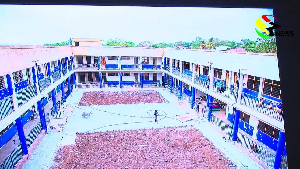The year 2024 witnessed several significant developments in Ghana's education sector, with some contributing positively to its growth and others having adverse effects.
Below is a summary of seven key events that shaped the educational landscape over the year, both positively and negatively:
Commissioning of STEM Schools
In 2024, a novel and unprecedented number of Science, Technology, Engineering, and Mathematics (STEM) schools were commissioned across the country by the government. These facilities cater to both Senior High School and Junior High School levels.
The focus on STEM and STEAM (Science, Technology, Engineering, Arts, and Mathematics) at the Senior High School level, free Wi-Fi in tertiary institutions, and the provision of laptops and other technological tools for educators aim to prepare Ghana's youth for the 21st-century world.
'1 student 1 Laptop' programme
In April, the government, through the Ministry of Education, rolled out the '1 Student 1 Laptop' programme for senior high school students across the country.
The Ministry refuted claims by former President John Dramani Mahama, now President-elect, that the policy was a ploy for vote-buying.
Kwasi Kwarteng, spokesperson for the Ministry of Education, emphasized that the initiative was a strategic move to bolster educational delivery and equip Ghanaian students for the challenges of the digital age.
Mahama alleged that the beneficiaries of the policy, primarily students within the voting demographic, were being targeted for electoral gain through the distribution of laptops.
In response, Kwarteng reiterated the government's objective to elevate educational standards to meet the demands of the Fourth Industrial Revolution and ensure that Ghanaian students are competitive on the global stage.
Controversy over changing uniform and rebranding public basic schools
In April, controversy erupted after the Minister of Education, Dr. Yaw Osei Adutwum, announced plans to introduce new school uniforms for public basic schools and repaint school buildings as part of a rebranding programme.
Dr. Adutwum indicated that public schools would be repainted from brown and yellow to vibrant blue and white. Speaking during a forum titled "The Free SHS Story" held in Accra, he stated:
"We are switching to blue and white. We are painting all the schools to give them an attractive outlook. This is the transformation Ghana deserves, and it is coming."
This move was met with mixed reactions, with some deeming it a misplaced priority.
Kwasi Kwarteng later clarified that the initiative targeted specific students and new structures, not all public schools. He emphasized that the goal was to enhance the aesthetics of new facilities without altering existing ones.
Strike Action
The education sector experienced several strike actions.
The Colleges of Education Teachers Association of Ghana (CETAG) declared an indefinite strike on June 14 due to the government's delay in implementing the National Labour Commission's Arbitral Award Orders and negotiated service conditions.
The strike, which lasted nearly two months, affected all 46 public colleges of education and necessitated adjustments to the academic calendar.
Fresh strike threat
CETAG announced another indefinite strike set to begin on December 31, 2024. This declaration followed an emergency meeting on December 20 to address the government's failure to honour critical agreements from prior negotiations.
In a December 23 statement, CETAG expressed frustration over repeated breaches of agreements and called for the government to address the situation urgently.
WAEC withholds BECE results over Government's indebtedness
In June 2024, the Basic Education Certificate Examination (BECE) was nearly jeopardized due to the government's indebtedness to WAEC.
While the exam was eventually held after partial payments were made, the marking of scripts was postponed in August due to the government's GH₵300 million debt to WAEC.
Alleged repackaging and distribution of 22,000 bags of expired rice to SHSs
In November, Samuel Okudzeto Ablakwa, the Member of Parliament (MP) for North Tongu, claimed 22,000 bags of expired and repackaged rice were distributed to Senior High Schools (SHSs) across the country in February this year.
According to Ablakwa, the National Food Buffer Stock Company conspired with a company known as Lamens Investments Africa Limited to carry out the disservice.
He alleged that the Buffer Stock storage facility in Kumasi, in the Ashanti region, was used to repackage expired rice brought from India, which expired in December 2023 but was repackaged into locally made sacks, "with inscription 'ECOWAS', 'Made in Ghana rice', but without an expiry date."
However, the Ministry of Education clarified on November 14, 2024, that the rice in question had been certified as safe for consumption by the Food and Drugs Authority (FDA).
The Ministry explained that Lamens Ventures, which was contracted by NAFCO, had imported the rice with an initial expiry date of December 2023. However, by the end of the year, some of the rice had not been distributed to schools.
Following the advice of the FDA, Lamens Ventures re-tested the rice in India, its country of origin, to assess its usability.
After the tests, the FDA confirmed that the rice was still safe for consumption and granted an extension of its "Best Before" date to April 30, 2024.
Kwasi Kwarteng, a spokesperson for the Ministry, emphasized that all rice distributed to schools in February 2024 had been certified as wholesome by the FDA. Additionally, Lamens Ventures sought and received FDA approval to re-bag the remaining rice with updated labels reflecting the new expiry date.
The FDA reiterated that the rice met all safety standards and posed no health risks.
2024 WASSCE results delay
The West African Examinations Council (WAEC) expressed disappointment over the government's recent release of GH₵25 million to offset part of the GH₵118 million owed to the Council.
According to WAEC, the funds were inadequate to enable the release of the delayed 2024 West African Senior School Certificate Examination (WASSCE) results, causing widespread concern among students, parents, and educational institutions.
Speaking to the media on December 23, WAEC's Head of Public Relations, John Kapi, highlighted the insufficiency of the amount provided, stating that it fell far short of the necessary amount to address the Council's operational and technical costs.
WAEC called on the government to urgently address the financial challenges to facilitate the release of the results and ensure the smooth functioning of its operations.
Meanwhile, the Minister of Education, Dr. Yaw Osei Adutwum, has announced that the results for the 2024 West African Senior School Certificate Examination (WASSCE) will be released by the West African Examinations Council (WAEC) on December 29.
Government indebtedness to CHASS and reopening of schools on January 3
On December 23, 2024, the Conference of Heads of Assisted Secondary Schools (CHASS) urged the Ministry of Education to delay the reopening of schools scheduled for January 3, 2025, until all outstanding financial obligations to schools and suppliers were fully settled.
In a letter addressed to the Ministry of Education, CHASS indicated persistent financial challenges hampering school operations due to outstanding arrears.
CHASS warned that failing to address the situation before January 3 could disrupt the reopening process.
The letter also referenced earlier correspondences, dated August 12, 2024, and September 20, 2024, and reiterated the Minister of Education's commitment during a December 18, 2024, Zoom meeting to release funds necessary for schools' effective operation.
However, CHASS expressed disappointment, noting that the recent disbursement of funds failed to resolve critical issues, including unpaid recurrent funds owed to schools, outstanding arrears for perishable items, exclusion of single-track and day schools from the recent funding allocation, lack of funds to transport food supplies from distribution centres to schools, and unpaid utility bills threatening essential services.
KA
Watch some videos from the recent Parliamentary sittings below:
Click to view details



General News of Wednesday, 25 December 2024
Source: www.ghanaweb.com

















